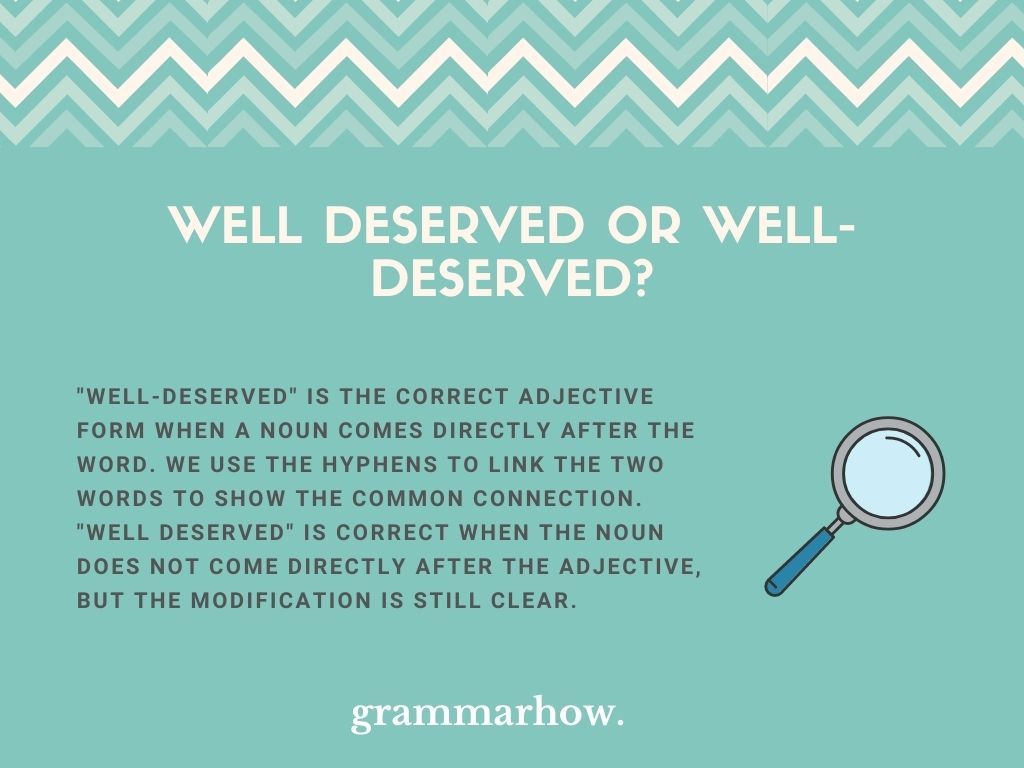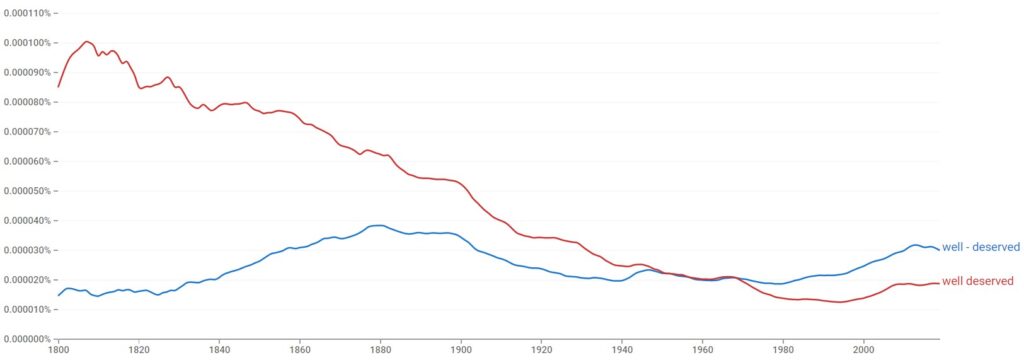When we want to show that something is “well-deserved,” we first need to make sure we understand the spelling options. It can be one or two words (hyphenated in some cases). This article will help you understand when which spelling works best.
Well deserved vs. Well-deserved
“Well-deserved” is the correct adjective form when a noun comes directly after the word. We use the hyphens to link the two words to show the common connection. “Well deserved” is correct when the noun does not come directly after the adjective, but the modification is still clear.

According to Google Ngram Viewer, “well-deserved” is the more popular choice of the two, but there isn’t much in it. This shows that both forms are correct, and it depends entirely on the sentence structure as to whether we hyphenate or not.

“Well deserved” is officially defined in The Cambridge Dictionary, which also offers “well-deserved” as an alternative spelling. The Oxford Dictionary provides an entry for “well-deserved” in the hyphenated form while showing that the separated variation is also correct.
Clearly, both forms are official variations, and the examples provided by the dictionaries make it much clearer when each one is beneficial.
You can refer to the following if you want to understand how noun placement affects the spelling:
- Noun before: After all your hard work, it’s well deserved!
- Noun after: That’s a well-deserved victory you got!
Well deserved
“Well deserved” does not need to be linked by a hyphen when the noun comes before it. We usually talk about something that “is well deserved” when we use it in this way. AP Style rules teach us that hyphens only matter when the noun comes directly after the word.
Since these rules do not apply to using “well deserved” with a noun before, it makes sense that we can use it without the hyphenated form.
The modification is still implied, but there’s no reason for us to include the hyphen when we place “well deserved” after the noun.
Check out these helpful examples to see how it works:
- That was incredibly well deserved! I can’t believe how much work you put into getting this right.
- I didn’t think it was very well deserved. Nevertheless, I suppose congratulations are in order.
- That was well deserved because I know how much work you put into getting that sorted out!
- I don’t think this is as well deserved as you seem to think it is. Though, I suppose you’re allowed to take the win where you can get it!
Well-deserved
We can hyphenate “well-deserved” when a noun comes directly after it. The hyphen works by linking “well” and “deserved” to show that both words modify the following noun. The hyphenation is a great way to show readers how modification works.
Without the hyphenation, “well” would modify “deserved,” and the following noun wouldn’t have much meaning. That’s why it’s important to include the hyphenated form.
The AP Stylebook teaches us that hyphens link two or more words when they modify the same noun. This is a common practice in English, and we follow these rules to make sure that the modification of the noun is clear.
Perhaps you’d benefit from checking these examples out to see how you can use it correctly:
- That was certainly a well-deserved win! I’m so proud of everything you’ve managed to achieve.
- It wasn’t a well-deserved victory, but I’m sure he’ll be gloating about it for plenty of weeks to come.
- It’s a well-deserved punishment for what you did, young man. I hope it leads to some self-reflection on your part.
- Well-deserved trophies are mounted on his wall because he works harder than any kid I’ve ever met!
Is “Deserved” Capitalized In The Word “Well-Deserved”?
Since “well-deserved” isn’t a proper noun, we do not have to capitalize either part of it. If you include it at the start of a sentence, you would only capitalize “well” since the hyphen allows us to treat the word as a single entity rather than two words.
However, if you include “well-deserved” in a title, you may choose to capitalize both parts. This could work well if every other word is capitalized in your title, since it would allow “Well-Deserved” to suit it better.

Martin holds a Master’s degree in Finance and International Business. He has six years of experience in professional communication with clients, executives, and colleagues. Furthermore, he has teaching experience from Aarhus University. Martin has been featured as an expert in communication and teaching on Forbes and Shopify. Read more about Martin here.

